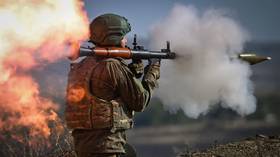
The conflict initially brought tactical gains for the US but has now led to growing strategic losses
By Ivan Timofeev, programme director of the Valdai Club.

A Russian serviceman of the Wolves reconnaissance and assault battalion in Luhansk People’s Republic, Russia. © Stanislav Krasilnikov / Sputnik
The latest situation in the Palestinian-Israeli conflict is an indication of the growing imbalance in the existing system of international relations. This is characterized by the emergence of new wars and the resumption of long-standing confrontations with large human casualties and the risk of further escalation. Claiming international leadership and the role of guarantor of the existing international order, the US has again failed to prevent the explosion of another flashpoint.
There is still a chance that the new crisis will be isolated and prevented from escalating into armed combat between major regional players. But the very fact that such a state-of-airs is emerging suggests that the fabric of the post-Cold War order is being torn more and more frequently on the wreckage of the bipolar system, once run by Moscow and Washington. Such developments are becoming increasingly difficult to mend.
Events in the Middle East have pushed the hostilities in Ukraine to the back of the media agenda. Meanwhile, even there, the situation hardly supports the permanence of the old status quo. Things would be different if Russia had been returned to the status of a defeated power and Kiev, and its Western backers, had finally consolidated the results of the collapse of the Soviet Union.
But the facts tell a different story. The Ukrainian army’s high-profile and expensive counteroffensive has failed to achieve its objectives. The Russian army is slowly but inevitably building up pressure on the front. Economic sanctions have not caused the country’s economy to collapse. Despite heavy damage, it is quickly adapting to the new conditions. Attempts to politically isolate Moscow have not worked either. For the Western partners of the Kiev authorities, the conflict is becoming increasingly expensive. The price could rise in the future as the Ukrainian armed forces are stripped of Soviet-made equipment and the need for new supplies grows. Ukraine’s economy is also in need of external cash injections in the face of military losses, demographic failure and persistent governance problems, including corruption.

Read more
If the Ukrainian conflict were the only US commitment in controlling the post-bipolar order, there might be fewer risks. The Western allies could focus all their efforts on countering Moscow. But their diffusion in other directions seriously complicates the problem. Resources will have to be dispersed not only to contain China, but also to put out fires where they should not have started. In all likelihood, Washington will be able to provide Israel with significant military and diplomatic support, thereby limiting the outbreak of another conflict. But any such conflagration requires a concentration of material and financial resources that are limited even for a power like the US. All the more so because there are other unresolved problems.
Years of efforts to prevent North Korea (the DPRK) from growing militarily have failed. Pyongyang now has both nuclear weapons and the means to deliver them. The crisis in US-Russian relations provides the DPRK with a window of opportunity – a possible increase in cooperation with Russia will run counter to US objectives, whereas Moscow used to be much less of a problem for Washington in this area. The situation with Iran is similar. The US withdrawal from the JCPOA in 2018 did not lead to Iran’s abandonment of its positions on its missile program and its policy in the Middle East. It has instead created the conditions for Tehran to return to its nuclear development.
In the case of both the DPRK and Iran, a military solution to the problem is hardly optimal. Other smoldering fires remain. Afghanistan has been largely forgotten, but forces hostile to the US and the West are growing stronger there. In Syria, the Assad government remains in power despite sanctions and attempts at isolation. In Africa, US allies are losing influence. Terrorists, drug traffickers and transnational criminal networks have not disappeared. It has been possible to fight them in close coordination with other major players and to coordinate policy with them on the basis of the UN Security Council. But the former level of trust has been undermined. And under conditions of “hybrid warfare” with Russia and growing contradictions with China, it will be more difficult to deal effectively with these problems.
At the same time, it is the Ukrainian conflict that appears to be the key to the post-bipolar order. The start of Russia’s offensive in 2022 gave the US a number of immediate tactical advantages. Washington has a powerful lever of influence over its allies in Europe. NATO has been given a new lease of life, and the process of bloc enlargement is underway. The long resistance of major Western European countries to persistent US demands to increase their defense spending and arms purchases has finally been broken. Thus, the militarization of Europe will proceed at a rapid pace. But European countries will have to pay for it themselves, diverting resources from civilian priorities. The conditions are ripe for the Americans to take over at least part of the European energy market: what former US President D. Trump could only dream of has been achieved almost overnight.
Another important tactical success has been total control over Kiev. It is the US that largely determines the ability to conduct military operations and sustain the economy. Control of Ukraine, or a significant part of it, destroys the prospects of a revival of the ‘Soviet empire’, at least in the European theater.

Read more
Strategically, however, the conflict has created serious problems for the US. The main one is the loss of Russia as a possible ally, or at least as a power that does not interfere with Washington. At the turn of the 20th and 21st centuries, all the conditions for such interaction with Moscow were in place. Moreover, Russia itself was ready for equal partnership relations with the US, provided that its interests, especially in the post-Soviet space, were taken into account.
Moscow has clearly not set itself the goal of “reviving the USSR” and has not sought to reformat the ex-USSR. On all key issues on the global agenda, Russia has long either cooperated with the US or refrained from active opposition. One can argue for a long time about who is to blame for the growing mutual confrontation – the positions of the parties are diametrically opposed. What matters are the results: The US has ended up with a major power among its implacable opponents in the person of Russia. Moscow is building close ties with China, which Washington sees as a long-term threat. The cost of the conflict with Russia for the US will be measured not only by its support for Ukraine, but also by the enormous price of containing the Russian-Chinese tandem, as well as dealing with problems in which Russia can enthusiastically harm the US. The fact that Russia itself also loses out, in part, does not improve the situation for Washington.
In sum, the tactical gains from the conflict in Ukraine have turned out to be combined with a major diplomatic defeat for Washington in the form of a multiplication of influential adversaries when all the conditions were in place to avoid it. For the EU, the strategic costs are even greater. The geographical proximity of the fighting and the greater security risks of an intentional or unintentional military clash with Russia play a role here. China, on the other hand, is strengthening its position. Beijing has gained the tranquillity of long northern borders, a large Russian market and the dispersion of American resources.
It cannot be ruled out that, under such conditions, the US and its allies will reconsider their notions of defeating Russia in the Ukraine conflict at any cost. The big question is whether Moscow will change its own approach. Russia is determined to fight for its interests in the long term. Trust in any Western proposals is close to zero. The burning up of American leadership on the other stove of the world political kitchen further reduces the motivation to support any compromises without full consideration of Russian interests. The outcome of the Ukrainian conflict, whenever it comes, will be a pivotal stage in the order that is taking shape before our eyes.




